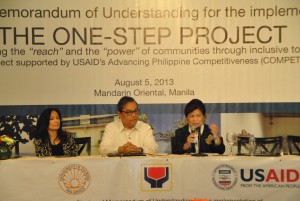
Social Welfare and Development Secretary Corazon Juliano-Soliman, Tourism Secretary Ramon Jimenez, and United States Agency for International Development (USAID) Mission Director Gloria Steele signed a Memorandum of Understanding for the creation of livelihood opportunities for Pantawid Pamilya beneficiaries.
Guests from the public and private sectors witnessed the formalization of the partnership for the implementation of the program dubbed “ One Step-Project” held in Makati City.
The One-Step Project
The One-Step Project is a collaboration in terms of moving forward to improving the quality of life of Filipinos. Pantawid Pamilya families will be able to participate in an inclusive tourism economy, as they will be provided with livelihood and employment opportunities. They will be linked to tourism destinations where their products may serve as high-quality food supply and commodities for tourists.
“The Filipino product must be bought not because it is Filipino but because it is good,” expressed Secretary Jimenez.
The USAID extends its support through its project called Advancing Philippine Competitiveness or COMPETE, in which the tourism sector is prioritized as a key competitive industry in the Philippines. For the project, both DSWD and DOT are expected to identify pilot sites for the expansion of socio-economic activities in communities where the tourism industry can be further developed.
The project will also develop a Poverty Reduction Roadmap through Tourism Development for 2013-2016. Research and analysis will be conducted as basis for the selection of pilot communities and other activities for documentation, publication, and dissemination of case studies for replication. Assessment studies will also be conducted on supply chain requirements for products and services by tourism enterprises that will serve as input to the skills training and livelihood programs.
Conscious convergence efforts
The One-Step Project will be the product of pooled resources both from the communities and of the public and private sectors engaged in the endeavor. Other agencies such as the Department of Trade and Industry (DTI), the Department of Agriculture (DA), the Department of Public Works and Highways (DPWH), and the National Anti-Poverty Commission (NAPC) will also contribute to the project.
There will also be a re-introduction of the inclusive tourism model to the communities in partnership with the regional offices, local government units (LGUs), private sector groups, non-government agencies, and people’s organizations. The agencies will also closely coordinate with the LGUs from the pilot communities for project conceptualization, sustainable implementation, monitoring and impact evaluation.
Emphasis on inclusive growth
Secretary Soliman said that the partnership is an opportunity for the communities to offer their unique cultures, develop them as part of growth corridors in the country, and provide intercultural and economic exchange among people, thereby providing an “active and purposive contribution to inclusive growth.”
Secretary Soliman further said that the poor themselves power their own development. The key is to include everyone in the process.
For his part, Secretary Jimenez added, “the world’s strongest democracies always began with the way the frontiers developed. They allowed the poorest to participate in areas of growth. The propensity to succeed exists in the communities themselves.”
Secretary Jimenez stressed that the project will bring about the social justice that the poor rightfully deserve, and reserve them a place at the table of prosperity enjoyed by others. He concluded that the “eradication of poverty begins with the restoration of trust in leadership, and with that trust, hope; with that hope, inspiration; and with that inspiration, the confidence to act.”
Protection and promotion of human rights
USAID Mission Director Steele shared the deepened support for the tourism industry, emphasizing the need to be wary of its negative impacts, particularly with regard to human trafficking.
Joint advocacy programs for the protection of women and children will also be promoted through the Child Wise and Gender Development Programs. It will include the provision of accessible facilities and services to the physically challenged visitors and community members. ###


